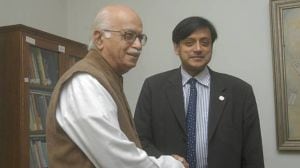Behind BJP, RSS’ diaspora outreach: spread of ideology abroad, political gains at home
After taking over as PM in 2014, Modi has made it a point to address large diaspora gatherings during his foreign visits, with prominent NRIs playing a key role in organising such events
 Prime Minister Narendra Modi welcomes Guyana President Mohamed Irfaan Ali during the 17th Pravasi Bharatiya Divas convention, in Indore. (PTI)
Prime Minister Narendra Modi welcomes Guyana President Mohamed Irfaan Ali during the 17th Pravasi Bharatiya Divas convention, in Indore. (PTI)
Many years ago, much before he became a name to reckon with in public life, a young Narendra Modi visited Guyana as part of the BJP and RSS’ exercise to reach out to the Indian diaspora living across the globe.
Cut to January 9, 2023, when addressing the 17th Pravasi Bharatiya Divas Convention in Indore, Guyanese President Mohamed Irfaan Ali urged Prime Minister Modi to recall that trip “when you felt the love of the Guyanese diaspora”.
“I also visited and studied here even before I became the president and I felt the love of the Indian people. We pray and hope that before the end of this year we will have the good fortune of your visit to Guyana,” said Ali, the chief guest at the event, as Modi smiled.
Later, during his speech, Modi expressed his gratitude to Ali for rekindling old memories. “When I had gone to Guyana I was nothing, not even a chief minister,” said the PM, as he went on to describe overseas Indians as the country’s “brand ambassadors”.
As the then RSS pracharak Modi had visited many countries, including the United States, in the early 1990s as part of the Sangh’s bid to spread its ideology beyond India’s borders.
In their book, “The RSS: A View to the Inside”, the authors, Walter K Andersen and Shridhar D Damle, mention that the first overseas RSS shakhas were set up in Kenya and Myanmar in 1947 by “emigrant swayamsevaks from India, who were also the catalysts for the further spread of the organisation overseas”.
Significantly, the Indian communist outfits had also made similar attempts to establish global linkages in the past, right from the days of the undivided Communist Party of India. However, such engagement of the Indian Left was limited to the erstwhile Soviet Union followed by China.
The Chinese state started engaging with Left-leaning intellectuals from various countries, including India, from the 1950s. In most cases, they were hired as translation experts in order to spread the communist ideology in local languages. During their visits to Beijing, they were put up in “friendship hotels” there.
The noted sinologist late Janaki Ballabh, known for translating various Chinese works including Mao Zedong’s Selected Works into Hindi, was one of these experts.
The ideology of the RSS-BJP, however, found more traction in the western countries, especially the United States, which has the second largest number of the RSS shakhas overseas after Nepal.
The formation of the first BJP-led government at the Centre, headed by Prime Minister Atal Bihari Vajpayee, marked a turning point in the BJP-RSS’ diaspora project. Under PM Vajpayee’s leadership, the Pravasi Bharatiya Sammelan was launched in 2003.
Meanwhile, in the US the Hindu American Foundation (HAF) emerged as an influential “non-profit Hindu advocacy group” over the years. Officially, the group says it is “politically agnostic and non-partisan, meaning we are informed, but do not favor and cannot endorse any one political party or any candidates”.
Among the HAF’s founding members is a US-based physician Mihir Meghani, who had written a paper titled “BJP: The Great Hindu Nationalist Ideology” as a history major at the University of Michigan in the early 1990s, that was purportedly “threatening” towards Muslims.
Later, Meghani distanced himself from the essay, saying, “I did write an essay that reflected my personal thoughts on the Hindu nationalist movement that was sweeping India. This essay was neither for public distribution nor written for the BJP…The BJP did remove my name from the essay on its website per my request as I do not stand by what is written.”
However, a pronounced tilt of the Indian diaspora towards the BJP has been evident in recent years, aided by the rise of the far-right in the west and other parts of the world.
After taking over as the PM in 2014, Modi has also made it a point to address large gatherings of the Indian diaspora when visiting foreign countries, with many prominent non-resident Indians (NRIs) playing a key role in organising such events.
The “Howdy Modi” event is a case in point, which was held in Texas in September 2019 in the run-up to the 2020 US presidential election. It was one of the largest diaspora gatherings, where PM Modi interacted with the audience with then US President Donald Trump by his side.
The first such event addressed by PM Modi was held at Madison Square in New York in 2014. Since then, he has addressed the diaspora in Australia, Japan, various European countries including UK and Germany, countries in the Gulf region, and in Bali last November on the sidelines of the G20 Summit.
In many ways, these attempts seem driven by the Sangh Parivar’s belief that the pull of “long distance nationalism”, a concept introduced by the late political scientist Benedict Anderson, can be harnessed not just for expanding the footprint of an ideology, but also to make political gains.



- 01
- 02
- 03
- 04
- 05




























